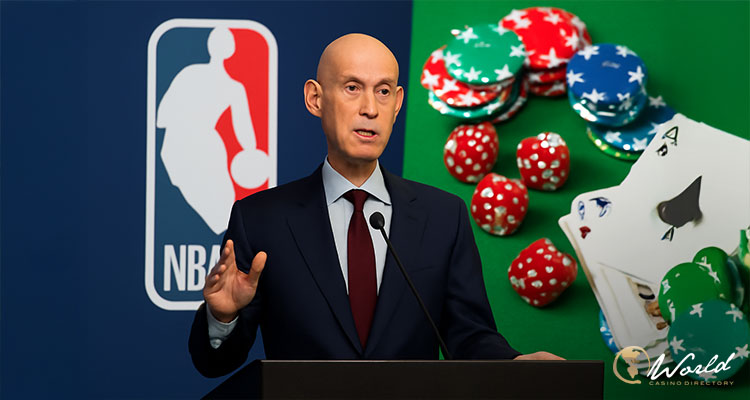As the NBA continues to expand its partnership with legalized sports betting, Commissioner Adam Silver is raising alarms about the potential risks that come with this burgeoning industry. Once a vocal supporter of legalizing sports betting, Silver is now calling for stronger regulation to safeguard the integrity of the game, protect players, and curb the negative behaviors tied to betting. His remarks come on the heels of a series of gambling-related controversies, including the high-profile case of former Toronto Raptors player Jontay Porter.
Silver’s Push for More Control Over Prop Bets
One of the key issues that Silver is focusing on is the prevalence of prop bets in sports gambling. These bets, which allow fans to wager on specific outcomes such as a player’s points, assists, or rebounds, have become increasingly popular. However, they also present significant risks, particularly when placed on players with limited involvement in games, like those on two-way contracts.
Silver’s concern is that players on such contracts may not have as much stake in the competition, making them more vulnerable to manipulation. “We’ve asked some of our partners to pull back some of the prop bets, especially when they’re on two-way players, guys who don’t have the same stake in the competition, where it’s too easy to manipulate something that seems otherwise small and inconsequential,” Silver explained. This approach aims to reduce opportunities for game manipulation, a problem brought to light by the Jontay Porter scandal, where the former player was found to have intentionally underperformed to influence betting outcomes. Porter was subsequently banned from the NBA for life.
The NBA’s efforts to limit prop bets on two-way players are part of a broader strategy to protect the integrity of the game. Silver noted that while some manipulation might seem minor, it can still significantly affect the betting landscape. By limiting these types of wagers, the league hopes to prevent further incidents and maintain fair play.
In addition to concerns about game manipulation, Silver also highlighted a growing issue: fan harassment. As prop bets have become more widespread, some fans have begun to focus less on team victories and more on individual player statistics. When a player’s performance doesn’t meet bettors’ expectations, even if the team wins, it often leads to backlash against the player, with many athletes receiving negative messages or threats online.
“We want to protect the competitors,” Silver said, as ESPN reports, addressing the increasing toxicity in the betting culture. “It’s often the case that your team wins and a player scores 25 points, but the bettor had them scoring 28 or 30. We want to protect the environment in the arena and make sure people aren’t getting out of hand.” This issue has prompted other organizations, such as the NCAA, to ban prop bets on college athletes, and Silver is now pushing for similar measures in the NBA to shield players from this growing digital abuse.
The Call for Federal Legislation
Silver has long advocated for a federal approach to regulating sports betting, but with the current state-by-state system in place, there are significant gaps in enforcement. The legalization of sports betting following the Supreme Court’s 2018 decision has resulted in a fragmented regulatory environment where each state has its own set of rules, making it harder to monitor and control betting activities consistently.
“I think there should be more regulation, frankly,” Silver said. “I wish there was federal legislation rather than state by state. You’ve got to monitor the amount of promotion, the amount of advertising around it.” A uniform federal framework could establish consistent standards for operators, particularly around advertising, data sharing, and the types of bets allowed.
Under the current system, the NBA has limited control over how sportsbooks operate, particularly when it comes to prop bets. While the league can negotiate with betting companies on certain issues, it doesn’t have full authority over all the practices of sportsbooks. However, Silver believes that the transparency created by legalized sports betting provides a significant advantage: the ability to monitor betting behavior more closely. “With this regulated structure, we can monitor it in ways that were unimaginable years ago,” he said, emphasizing the ability to trace where bets are being placed and track unusual betting patterns.
Silver’s shift in tone reflects the evolving challenges the NBA faces as it navigates the intersection of sports and gambling. In the past, the league has embraced the financial benefits of sports betting, but the rise of gambling-related controversies and the associated risks to players and the integrity of the game have led to a more cautious stance.
“I think we need to protect the players and ensure the integrity of the game,” Silver said. The NBA is not backing away from its support of legalized betting, but Silver’s comments signal a renewed focus on creating a more controlled and sustainable gambling environment.
The NBA’s efforts to restrict prop bets on vulnerable players, regulate betting behavior, and push for federal oversight demonstrate a commitment to balancing the financial benefits of legalized sports betting with the need to preserve the integrity of the league and protect its players. As the industry continues to evolve, Silver’s leadership will be critical in shaping how the NBA addresses the growing influence of gambling on professional sports.


